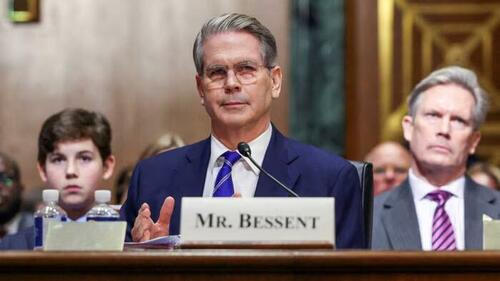Late on Monday, the Senate confirmed Scott Bessent’s nomination for Treasury Secretary in a 68–29 vote, putting him in a key role in implementing President Trump’s tariff and growth agenda. The billionaire investor will be spearheading Trump’s plan of cutting taxes and curbing deficits, while putting forward a tariff plan that also facilitates growth.
The Senate Finance Committee approved Bessent’s nomination for Treasury Secretary on a 16-11 vote, with two Democrats—Sens. Maggie Hassan (D-N.H.) and Mark Warner (D-Va.)—joining Republicans. Democrats who opposed his nomination alluded to concerns about his tax dispute with the IRS.
“Like a lot of Wall Street titans, he’s opted out of paying a fair share into Medicare,” said Sen. Ron Wyden (D-Ore.), ranking member on the committee.
Bessent has previously said the U.S. faces economic calamity if Congress does not renew key provisions from Trump’s Tax Cuts and Jobs Act that are set to expire Dec. 31, 2025. According to the Epoch Times, negotiating the extension of those tax cuts will be one of Bessent’s major responsibilities even as he pushes for 3 percent annual growth, significant trims to deficits, and increasing domestic oil production by 3 million barrels a day.
Senate Majority Leader John Thune (R-S.D.) described the Wall Street veteran as an “example of the American dream in action.”
“He brings a wealth of private sector experience in the economy and markets to his new role, as well as the concern for the needs of working Americans,” Thune said on the Senate floor.
Senate Finance Committee Chairman Mike Crapo (R-Idaho) defended Bessent before the vote, saying that the Key Square Group founder has complied with tax laws.
Many Democrats, naturally, disagreed. Sen. Sheldon Whitehouse (D-R.I.), one of the Democrats who voted against Trump’s pick to lead the Treasury Department, called it a “double standard in America” during an executive committee hearing on Jan. 21.
Sen. Elizabeth Warren (D-Mass.) said Bessent’s nomination further highlights billionaires’ influence on U.S. politics. “Billionaires dominate the American economy, and Republicans plan to give them more tax breaks,” she said.
In his Jan. 16 confirmation hearing in front of the committee, Bessent discussed various economic issues. Bessent has expressed how critical it is to extend the 2017 Tax Cuts and Jobs Act (TCJA), President Donald Trump’s signature legislation from his first term in the White House.
Sitting before the Senate Finance Committee during his Jan. 16 confirmation hearing, the Wall Street veteran told lawmakers that allowing the TCJA to expire would cause “an economic calamity” and lead to “financial instability.” “We will see a gigantic middle-class tax increase. We will see the child tax credit halved,“ Bessent said. ”We will see the deductions halved … it has the potential for a sudden stop.”
Contrary to his most recent hedge fund letter, the billionaire financier now also supports the president’s tariff plans. He highlighted the various benefits associated with trade levies, such as strengthening the U.S. dollar, forcing foreign manufacturers to export deflation, and nudging consumers to change their preferences to support American jobs.
And speaking of flipflopping, exactly one year after he wrote in his KeySquare letter to investors that he found it "unlikely that across-the-board tariffs, as currently reported by the media, would be enacted", the FT reported that Bessent is now pushing for new universal tariffs on US imports to start at 2.5% and rise gradually.
The 2.5% levy would move higher by the same amount each month, the people familiar with it said, giving businesses time to adjust and countries the chance to negotiate with the US president’s administration.
The levies could be pushed up to as high as 20 per cent — in line with Trump’s maximalist position on the campaign trail last year. But a gradual introduction would be more moderate than the immediate action some countries feared.
The proposal by Bessent comes as Trump’s team debates how to implement tariff plans, with the president escalating his tariff rhetoric on Monday in a speech in Florida, threatening more duties on semiconductors, metals and pharmaceutical goods.
“We have to bring production back to our country,” Trump said.
Trump was speaking after a day of turmoil in US stock markets, triggered by a tech sell-off as China appeared to make a leap ahead of the US in the global artificial intelligence race. His threat to impose tariffs on semiconductors entering the US would be difficult to carry out given the impact on tech companies relying on chipmakers such as Taiwan’s TSMC.
In contrast, Bessent’s plan would see just 2.5% added to tariffs each month. According to the FT, it was unclear if the Treasury secretary had convinced other central stakeholders, including Howard Lutnick, Trump’s pick for commerce secretary, to adopt his proposal for a gradual introduction of tariffs.
Meanwhile, Trump has threatened to force tariffs of up to 25% on imports from Canada and Mexico as soon as this weekend, and in recent days threatened Colombia with 25% tariffs in a dispute over deportees. That said, an FT source said that Trump’s thinking said he was weighing different options. “There is not a single plan the president is ready to decide on yet.”
When asked by reporters last week whether he planned to introduce universal tariffs, Trump replied: “We may. But we’re not ready for that yet.”
We may not be there yet, but we will be there soon, especially if Trump follows through on his urging to abolish income tax altogether, which implies that tariffs would need to somehow generate similar amounts of revenue. In that case a 20% universal tariff is just the start.
